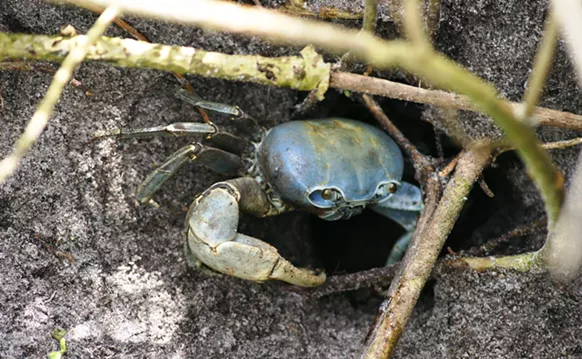Activists have fought the project in hopes of protecting the indigo snakes and gopher tortoises that live in the forest habitat. The activists have also pointed out that Scripps conducts secretive research using potentially hazardous pathogens that could present a danger to local residents. Furthermore, they say, this is an egregious case of a private entity receiving handouts from taxpayers.
Five years ago, activists staged a tree-sit to protect
It was 2003 when Jeb Bush and the Florida Legislature lured the Scripps Research Institute to Florida with a $310 million economic development plan. There was a lot of buzz about this new employer that
But environmentalists have always decried the government handing over some of the state's last undeveloped acreage to private entities. In the mid-’00s, the county spent $100 million buying 2,000 acres of land — formerly a citrus grove called Mecca Farms — and preparing for construction. But environmentalists fought the project in federal court and prevailed. In 2006, Scripps instead located to a site in the Abacoa area of Jupiter, and the county later sold the Mecca Farms site to the South Florida Water Management District, which intended to turn it into a reservoir. But that wasn't the end of the story.
The ball started rolling for Scripps Phase II — a mixed-use development with labs, retail, and homes — on the Briger parcel.
According to Tsolkas, his group has been contesting the project "similar to how Scripps was defeated on Mecca Farms." Permitting is done piecemeal — one permitting process to build a road here, another process for building a building there — and his group has been challenging parts of the project in hopes of stopping the whole.
Tsolkas says that developers continually skirt legal challenges from environmentalists by using a legal runaround. He says his group first raised objections in 2010 about everything from endangered species to hazardous waste but was told by authorities that "this just conceptual; we'll [address those concerns] when they apply for construction permits."
Although activists were unsuccessful in contesting roads where Kolter Homes is developing housing, they are now challenging Scripps on the grounds that its labs may house hazardous waste that could potentially enter a federal
In a second amended complaint asking the South Florida Water Management District for a hearing, the petitioners wrote: "Scripps Phase II is proposed to be built on top of forest that drains into the Intracoastal Waterway, and Scripps is known to handle hazardous and nuclear materials, and as such can inflict irreversible damage on water that millions of people rely on to drink, and that is required for successful restoration of the Everglades. The area of potential impact to residents, and the likelihood of injury to
This summer, USA Today published an investigation of accidents, safety violations, and near-misses at facilities that work with potentially hazardous pathogens like ebola and anthrax. The paper found that Scripps was very secretive about its research:
"The institute redacted information from its biosafety committee minutes and incident reports... The names of pathogens, the topics of research, and information about safety concerns are among the information blacked out from the records. A Scripps attorney told USA Today that the information was redacted because it contained 'trade secrets, unpublished scientific hypotheses and research strategies, descriptions of experiments, proprietary methodologies, and materials and other confidential commercial or business information.'"
"Scripps is moving forward with construction," says Tsolkas. "Ostensibly they're still moving forward with laboratories. All the people buying houses around there should know how Scripps is transporting hazardous waste through the neighborhood."
Tsolkas says that Scripps was defeated only late in the
This morning, activists from Everglades Earth First are staging a rally outside the West Palm Beach courthouse. If convicted, the defendants face maximum sentences ranging from months to over a year of jail time.












